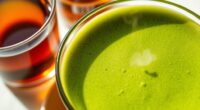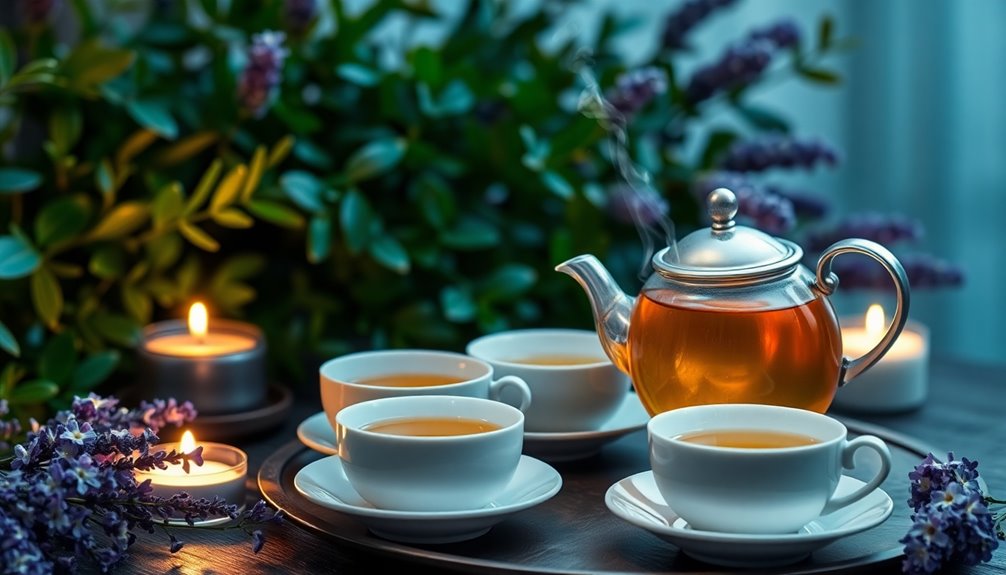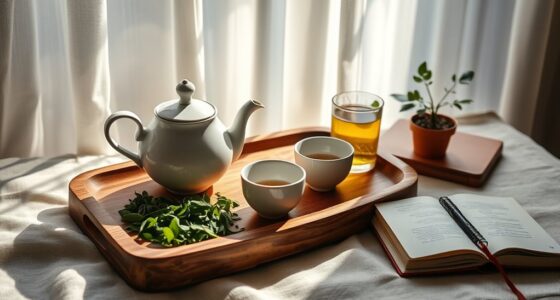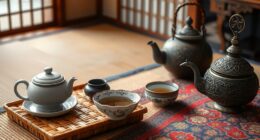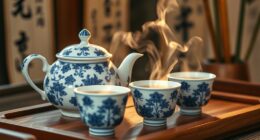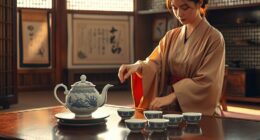For a restful night, choose herbal tea blends featuring calming herbs like chamomile, lemon balm, or valerian root, avoiding any with caffeine or stimulants. Use high-quality dried herbs and steep them in water just below boiling for 5-10 minutes to preserve their soothing properties. Establish a calming routine by enjoying your tea at least an hour before bed. Keep exploring to discover the best herbal pairings and preparation tips for peaceful sleep.
Key Takeaways
- Use calming herbs like chamomile, lemon balm, and valerian that promote relaxation without caffeine.
- Avoid blends containing stimulating herbs such as green tea or yerba mate in evening teas.
- Prepare herbal tea with water just below boiling and steep for 5-10 minutes to preserve soothing compounds.
- Consume herbal tea at least one hour before bed to support natural sleep signals.
- Incorporate herbal tea into a calming bedtime routine alongside other sleep hygiene practices for best results.
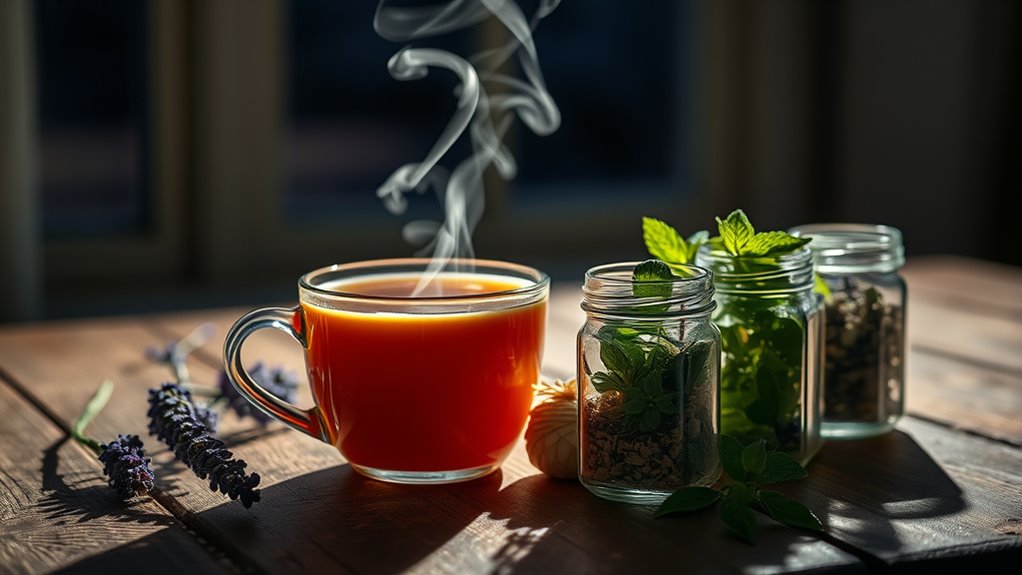
When it’s time to unwind after a long day, a soothing night-time herbal tea blend can be your best ally for a restful sleep. Preparing herbal tea properly plays a pivotal role in maximizing its calming effects. With good herbal tea preparation, you guarantee that you extract the maximum benefits from each herb, whether it’s chamomile, valerian root, or lavender. Start by choosing fresh or high-quality dried herbs, and use the right water temperature—generally just below boiling—to prevent destroying delicate plant compounds. Let the tea steep for about 5-10 minutes, depending on the herb, to fully release its soothing properties. Straining the tea ensures a smooth experience, free of bits that might interfere with relaxation. Incorporating a consistent ritual around herbal tea preparation not only enhances its calming effects but also signals to your brain that it’s time to wind down, supporting your sleep hygiene tips. Additionally, understanding the herbal properties of each ingredient can help you select the most effective blends for your needs.
Your evening routine is essential in establishing healthy sleep patterns. Drinking a herbal tea formulated for sleep can become a part of your nightly sleep hygiene tips, helping you create a predictable transition from wakefulness to rest. Keep your tea consumption at least an hour before bed to allow the herbs to take effect without causing disruptions during the night. Avoid caffeine-containing herbs like yerba mate or green tea in your evening blends, as they can interfere with your ability to fall asleep. Instead, opt for herbs known for their relaxing qualities, such as chamomile or lemon balm, which promote tranquility without causing drowsiness during the day. Remember, consistency is key—making herbal tea a nightly habit reinforces your body’s natural sleep signals.
While herbal teas are a gentle way to promote sleep, they work best when combined with other sleep hygiene tips. Maintain a regular sleep schedule, limit screen time before bed, and keep your bedroom cool and dark. These practices support the calming effects of your herbal tea and help you fall asleep faster. Also, avoid heavy meals or alcohol close to bedtime, as they can disrupt sleep cycles. When you combine mindful herbal tea preparation with these sleep hygiene tips, you create an all-encompassing approach to better rest. This holistic routine can profoundly improve your sleep quality over time, making those nightly sips more effective and enjoyable. Ultimately, the right herbal tea, prepared thoughtfully and integrated into your nightly routine, can become a simple yet powerful tool to help you unwind and enjoy a more peaceful sleep.
Frequently Asked Questions
Are Night-Time Herbal Teas Safe for Children?
You might wonder if children’s herbal teas are safe for your kids. While some herbal tea safety guidelines suggest certain herbs can be harmless, others may cause adverse effects or reactions. Always check labels and consult your child’s healthcare provider before giving them herbal teas. Not all children’s herbal teas are suitable for all ages, so it’s vital to choose age-appropriate options and monitor for any side effects to guarantee safe consumption.
Can Herbal Teas Interact With Sleep Medications?
Imagine your sleep medication as a delicate dance partner, and herbal tea interactions are the unexpected dance moves that could trip you up. Some herbal teas, like valerian or chamomile, can amplify sleep medication effects, making you overly drowsy, while others may interfere with absorption. Always consult your doctor to make certain herbal teas won’t disrupt your sleep or cause unwanted interactions, keeping your nightly routine safe and smooth.
How Long Before Bed Should I Drink Herbal Tea?
When considering timing considerations for herbal infusion timing, you should aim to drink your herbal tea about 30 to 60 minutes before bed. This window allows the calming effects to set in without disrupting your sleep. Avoid drinking it too close to bedtime to prevent waking up during the night. Experiment with your schedule to find what works best for your body and guarantees a restful night’s sleep.
Are There Any Herbal Teas to Avoid During Pregnancy?
During pregnancy, you should avoid certain herbal teas because of potential herbal pregnancy risks. Some herbs, like chamomile or peppermint, are generally safe herbal options, but others like fennel or sage can cause issues. Always check with your healthcare provider before drinking any herbal tea, and opt for those specifically labeled safe for pregnancy. This guarantees you enjoy herbal teas without risking your health or your baby’s well-being.
Do Herbal Teas Help With Insomnia Long-Term?
If you’re wondering whether herbal tea variety can help with insomnia long-term, the answer is yes, but with some caveats. Some herbal teas may offer long-term benefits by promoting relaxation and reducing stress, which can improve sleep quality over time. However, consistency matters, and not all herbal teas have the same effects. Always choose gentle, sleep-friendly options, and consult a healthcare provider for ongoing sleep issues to guarantee safety and effectiveness.
Conclusion
So, next time you reach for that calming herbal tea, remember it’s not a sleep magic potion. Ironically, even blends marketed as “sleep aids” can sometimes do more harm than good. Sometimes, the best way to truly unwind is to put down the cup and let your body naturally drift off. After all, no herbal infusion can replace a peaceful mind—so maybe the secret to better sleep is just… relaxing, without the herbs.


